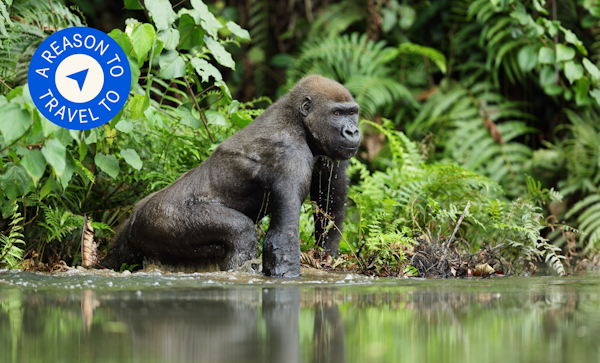Two buffalo saunter along white sands to splash in the Atlantic Ocean before disappearing into a thick forest stretching down to the beaches of Pongara National Park. In a country where an estimated 88% of the land is still primary forest, wildlife encounters like this soon become all too commonplace.
Welcome to little-known Gabon, the African country that’s home to two million people, 95,000 elephants and thousands of lowland gorillas and chimpanzees – and which is attempting to position itself as an alternative safari destination in 2023. Launching itself to the world in January as “The Last Eden,” Gabon is where the lush forests of equatorial Africa collide with the crashing surf of the Atlantic.
Look at a map of West Africa and you can pick out the large land mass of Gabon (which has some 100,000 square miles of rainforest, mountains and coastline) between Equatorial Guinea, Cameroon and the Republic of Congo. This former French colony is one of the most biodiverse destinations in the region, with 13 national parks protecting 11 per cent of the country’s nature and wildlife.

For the adventurous traveler looking to get off the well-trod safari circuit, Gabon delivers extraordinary wildlife to spot. Gorilla trekking is possible in Loango National Park (where permits, at around $900, cost less than in Rwanda or Uganda). Large troupes of mandrills (the world’s largest species of monkey) are found in Lopé National Park, while Gabon’s unusual “surfing hippos” can be spotted on the Atlantic Coast. (The creatures quite literally…run into the ocean’s surf.)
Forest elephants and buffalo are everywhere, and they’re easily spotted in Pongara National Park. Just a 30-minute boat ride away from Libreville, the capital city, Pongara also offers unique opportunities for a coastal safari, where buffalo can be seen on the white sand beaches and hippos spotted among the dense mangroves. Whales can be spotted off the same beaches between July and September, while leatherback turtles nest here in December and January.

Visit Gabon in 2023 and you’ll be seeing the nation in a raw state. Historically, Gabon hasn’t pushed for tourism due to its economic reliance on fossil fuels like oil and gas. Today, the government is seeking to move away from extractive industries and betting that ecotourism can not only fill a looming economic void but help to protect one of the world’s few carbon-negative countries. On paper, Gabon’s green credentials are excellent, with innovative conservation programs using AI cameras to track wildlife and catch poachers, Meanwhile, authorities hope to raise conservation funds by selling “carbon credits” to richer countries.
Yet tourism is a new concept in Gabon, and infrastructure and facilities for ecotourism are limited outside of the well-established safari lodges and resorts in Pongara National Park. There’s often a disconnect between Gabon’s grand ecotourism plans and the reality on the ground. Space in safari lodges is limited, gorilla-trekking permits are difficult to secure given that there’s currently only one habituated family of gorillas in Loango National Park, and NGOs struggle to raise funds to rehabilitate trafficked gorillas and other animals. Human-wildlife conflicts are common, too: the country has installed an extensive network of electric fences to stop elephants from encroaching on villages.
For the intrepid safari goer, however, this all adds to the destination’s intrigue. Just remember that Gabon is very much an emerging tourism destination, and that not everything will go to plan. If you’re prepared to be waylaid by tropical rains and aren’t scared by early morning run-ins with elephants on bush hikes, then the country’s potential as an alternative safari destination is an irresistible reason to visit Gabon in 2023.

Where to eat in Gabon
You’ll want to fuel up for a day on safari, and baguettes, pastries and omelets make for a wholesome French-inspired breakfast. Barbecued prawns (gambas) and grilled chicken are a feature of tantalizing post-safari beach buffets, as you enjoy fresh seafood, meat and vegetables as the sun sets over the Atlantic Ocean.
Gabonese cooking provides a sublime blend of West African spices and French cooking techniques (a culinary holdover from the colonial period). Brochette (skewered, barbecued fish and meat) is a favorite at resorts like Pongara Lodge, while plantains and cassava are often followed by chocolate mousse and crème brûlée. The nation’s favorite dish is nyembwe chicken, a stewed delicacy prepared with palm butter, onions and garlic.
Where to drink in Gabon
If you’re dining in Libreville’s fanciest restaurants (try Roma for upmarket Mediterranean cuisine with West African flair), then don’t be surprised by the eclectic wine menus. Yet the availability of Bordeaux wines in remote safari lodges across Gabon might surprise you. For the more casual traveler, Libreville’s beaches are the place to wind down with a beachside beer at a restaurant or bar overlooking the water. The local beer of choice is Regab, which should only ever be served ice-cold.
Where to stay in Gabon
Located on the beaches just north of Libreville’s airport, Hotel La Sablière is a luxurious place to start your Gabonese journey. In the city center to the south, you can take your pick of the Park Inn by Radisson, Hôtel le Cristal and many other hotels in the capital. The real adventure begins in the national parks. Pongara National Park, just a quick boat ride away from Libreville, is home to the relative luxury of Pongara Lodge and River Lodge Resort, where you can enjoy scenic surroundings just steps away from the forest and beaches. In Loango National Park (where you can see gorillas and hippos), Luxury Green Resorts operates three luxury glamping camps in remote locations.
